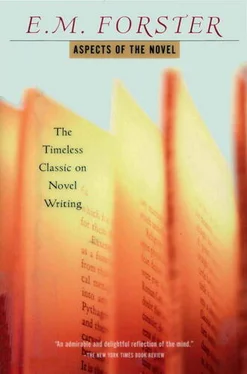IT IStempting to conclude by speculations as to the future of the novel, will it become more or less realistic, will it be killed by the cinema, and so on. Speculations, whether sad or lively, always have a large air about them, they are a very convenient way of being helpful or impressive. But we have no right to entertain them. We have refused to be hampered by the past, so we must not profit by the future. We have visualized the novelists of the last two hundred years all writing together in one room, subject to the same emotions and putting the accidents of their age into the crucible of inspiration, and whatever our results, our method has been sound—sound for an assemblage of pseudo-scholars like ourselves. But we must visualize the novelists of the next two hundred years as also writing in the room. The change in their subject matter will be enormous; they will not change. We may harness the atom, we may land on the moon, we may abolish or intensify warfare, the mental processes of animals may be understood; but all these are trifles, they belong to history not to art. History develops, art stands still. The novelist of the future will have to pass all the new facts through the old if variable mechanism of the creative mind.
There is however one question which touches our subject, and which only a psychologist could answer. But let us ask it. Will the creative process itself alter? Will the mirror get a new coat of quicksilver? In other words, can human nature change? Let us consider this possibility for a moment—we are en-tided to that much relaxation.
It is amusing to listen to elderly people on this subject. Sometimes a man says in confident tones. "Human nature's the same in all ages. The primitive cave man lies deep in us all. Civilization—pooh! a mere veneer. You can't alter facts." He speaks like this when he is feeling prosperous and fat. When he is feeling depressed and is worried by the young, or is being sentimental about them on the ground that they will succeed in life when he has failed, then' he will take the opposite view and say mysteriously, "Human nature is not the same. I have seen fundamental changes in my own time. You must face facts." And he goes on like this day after day, alternately facing facts and refusing to alter them.
All I will do is to state a possibility. If human nature does alter it will be because individuals manage to look at themselves in a new way. Here and there people—a very few people, but a few novelists are among them—are trying to do this. Every institution and vested interest is against such a search: organized religion, the state the family in its economic aspect, have nothing to gain, and it is only when outward prohibitions weaken that it can proceed: history conditions it to that extent. Perhaps the searchers will fail, perhaps it is impossible for the instrument of contemplation to contemplate itself, perhaps if it is possible it means the end of imaginative literature—which if I understand him rightly is the view of that acute inquirer, Mr. I. A. Richards. Anyhow—that way lies movement and even combustion for the novel, for if the novelist sees himself differently he will see his characters differently and a new system of lighting will result.
I do not know on the verge of which philosophy or what rival philosophies the above remarks are wavering, but as I look back at my own scraps of knowledge and into my own heart, I see these two movements of the human mind: the great tedious onrush known as history, and a shy crablike sideways movement. Both movements have been neglected in these lectures: history because it only carries people on, it is just a train full of passengers; and the crablike movement because it is too slow and cautious to be visible over our tiny period of two hundred years. So we laid it down as an axiom when we started that human nature is unchangeable, and that it produces in rapid succession prose fictions, which fictions, when they contain 50,000 words or more, are called novels. If we had the power or license to take a wider view, and survey all human and pre-human activity, we might not conclude like this; the crablike movement, the shiftings of the passengers, might be visible, and the phrase "the development of the novel" might cease to be a pseudo-scholarly tag or a technical triviality, and become important, because it implied the development of humanity.
Abel Chevalley, Le Roman Anglais de Notre Temps, Oxford University Press, New York.
I have touched on this theory of inspiration in a short essay called "Anonymity", Hogarth Press, London.
Paraphrased from Système des Beaux Arts, pp. 314-315. I am indebted to M. André Maurois for introducing me to this stimulating essay.
Translated by Dorothy Bussy as The Counterfeiters, Knopf.
Paraphrased from Les Faux Monnayeurs, pp. 238-246. My version, needless to say, conveys neither the subtlety nor the balance of the original.
Ulysses, Shakespeare & Co., Paris, is not at present obtainable in England. America, more enlightened, has produced a mutilated version without the author's permission and without paying him a cent.
Only to be found in a collected edition. For knowledge of it, and for much else, I am indebted to Mr. John Freeman's admirable monograph on Melville.
See that sound and brilliant essay, The Structure of Wuthering Heights, by C.P.S., Hogarth Press.
There is a masterly analysis of The Ambassadors from an other standpoint in The Craft of Fiction.
See the Letters of H. James, Vol. II.
The first three books of A la recherche du temps perdu have been excellently translated by C. K. Scott Moncrieff under the title of Remembrance of Things Past, A. & C. Boni.












